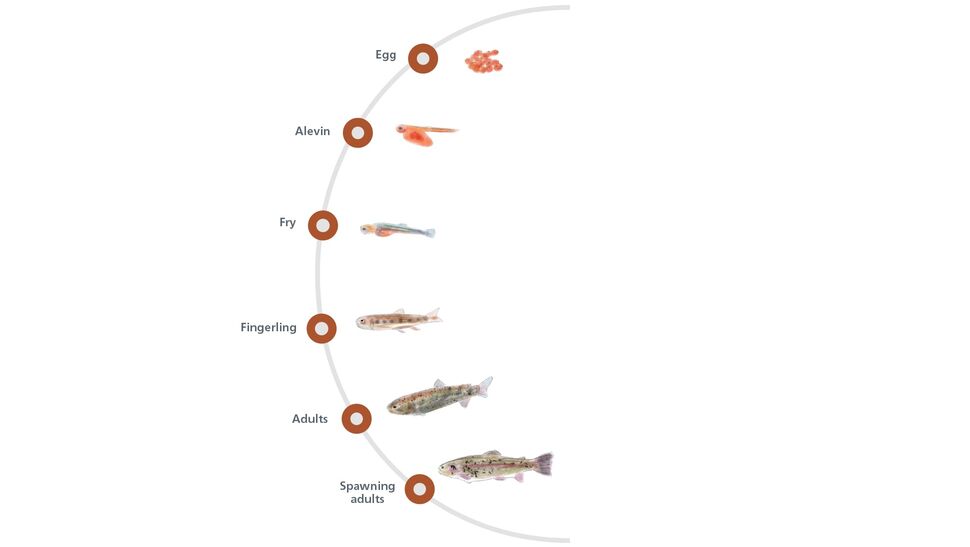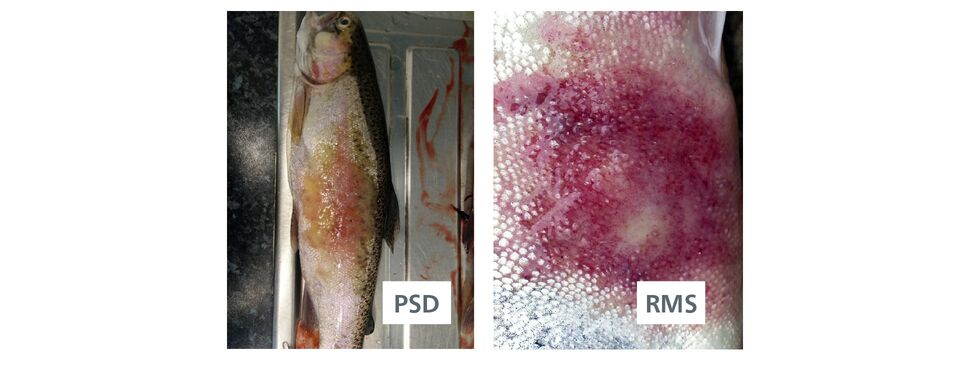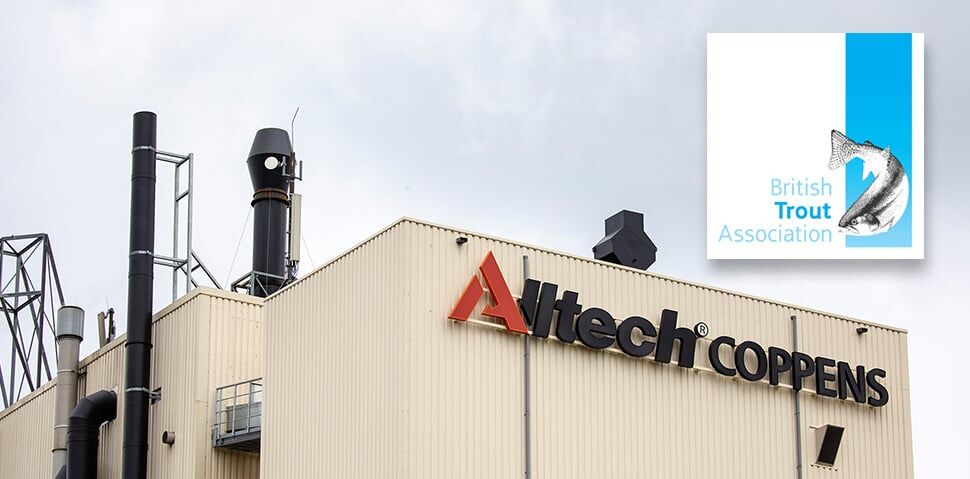
Throughout the UK, aquaculture is an industry of growing importance, providing valuable jobs and income for the economy.
In particular, trout farming makes up a significant portion of the industry, with almost 290 trout farms producing around 17,000 tonnes per year.

Throughout the UK, aquaculture is an industry of growing importance, providing valuable jobs and income for the economy. In particular, trout farming makes up a significant portion of the industry, with almost 290 trout farms producing around 17,000 tonnes per year.As Brown Trout (Salmo trutta) is indigenous to the UK, it was the first fish farmed. However, the majority of today’s farmers produce Rainbow Trout (Oncorhynchus mykiss), which was introduced from North America. Rainbow Trout are more tolerant of warm water than the Brown variety, grow faster and are often slightly larger in size. Its ability to cope with the climate and farming system made it a popular choice.
Other farmed varieties include Golden Trout (Oncorhynchus aguabonita) and Blue Trout. Some restocking farms also farm trout hybrids such as Spartic Trout (a cross of Arctic Char and Brook Trout) and Tiger Trout (a Brown Trout and Brook Trout cross).
Of the 17,000 tonnes of trout produced in the UK each year, around 75% is farmed by table producers. The majority are farmed in freshwater tanks, ponds, raceways, pens and increasingly marine pens. The traditional market size has always been portion-sized trout. However, in recent years, increasing numbers of larger, 3–4 kg fish are being farmed and sold as fillets or fillet portions.
UK fish farms usually concentrate on different aspects of the life cycle. Hatcheries produce ova from broodstock and fingerlings. The fingerlings are then sold on to producers for growing into restocking or table trout. Table producers, in turn, provide fish to processors, while restockers will supply put-and-take sport fisheries, which are very popular in the UK. Some farms may undertake several of these business activities and, in addition, may have a shop, a smokery/processing unit or a fishery that is often open to the public.

Feed specifications
Despite the relaxation of EU legislation banning land animal proteins (LAPs) in aquafeeds, the leading UK retail chains do not accept the use of LAPs as a substitute for fish protein. This means that only fish meal and vegetable proteins are used in these feeds.
Fish meal is roughly double the cost of LAP and amounts to an extra 20% in feed costs. Compounding this problem is the difficulty and cost of sourcing non-GM feed ingredients — especially soya.
Restocking farms are able to use a variety of feed ingredients and can, therefore, use the full range from Alltech Coppens. The most popular products are Astax 22, which enables good performance and body shape, and Crystal Astax, for farms that wish to maximise growth rates. Our floating trout feeds, such as Grower Astax, are also very popular for restocking farms where the farmers wish to accustom the fish to surface feeding, making them ready for stocking into fly fishing lakes and rivers.
Industry challenges
The predominant diseases affecting trout in the UK are primarily skin diseases such as Red Mark Syndrome (RMS) and Puffy Skin Disease (PSD). These diseases are not fatal, and the severity of infection varies between seasons. However, they cause unsightly lesions on the fish’s skin, which prevent them from being sold. Although these are difficult diseases to control, the symptoms can often be managed by feeding functional feeds, such as Cofit.
Other challenges that face the industry are the weather extremes we are experiencing more frequently now. Water shortages are forcing farmers to reduce stocks during periods of very dry weather, or look to recirculation technologies, especially for larger table farms. The COVID-19 crisis has also led to significant challenges for the industry, with retailers reducing their fish ranges. Consequently, many supermarkets have removed trout from their shelves in 2020. Hopefully, this situation will improve soon, as restrictions are gradually eased.
The UK trout angling sector was also hit hard during lockdown restrictions. Angling was prohibited throughout the UK for several weeks at the start of lockdown. Thankfully, outdoor activities are permitted once again.

Regulation
Alltech Coppens is proud to be a member of the British Trout Association (BTA), which represents trout farmers throughout the UK. The BTA was set up in 1983 and represents around 80% of trout production in the UK. It has over 50 members, made up of trout farmers, feed suppliers and a number of aquacultural academics. The BTA is entirely funded by trout farmers and feed suppliers and receives no direct funding from the Government.
The BTA helps to regulate the aquaculture industry, with a view to promoting food safety, compliance with legislation and sustainability. It also plays a pivotal role in the continuing development of the industry on three fronts:
- Ensuring that the UK trout industry has a reasonable legislative framework within which to operate.
- Maintaining a structured and relevant programme of research and development.
- Providing an appropriate level of generic promotion to underpin the marketing activities ongoing within the industry.
To ensure that the industry maintains a high profile in Europe, the BTA has a seat on the Federation of Aquaculture Producers and COPA/COGECA, which is the European grouping of farmer’s unions and co-operatives. With the ongoing support of the BTA, the 60-year-old UK trout farming industry continues to grow and shows no sign of slowing down.

